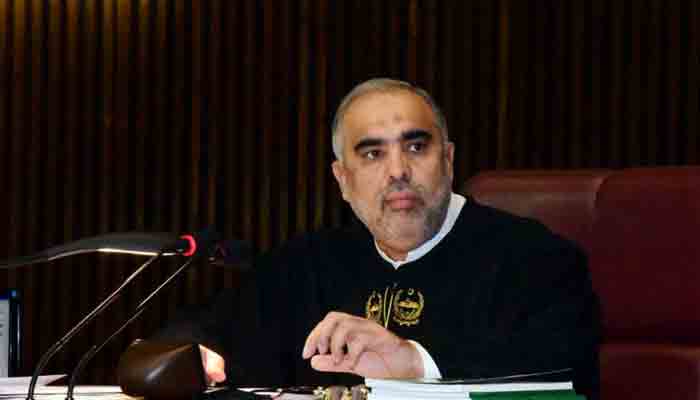NA session notification: Asad invokes rare constitutional provision to justify delay
The wordings of the notification clearly indicated that he admitted his inability to summon the session within fourteen days as enshrined in the Constitution.
ISLAMABAD: The Speaker National Assembly, Asad Qaiser, has invoked, in his notification, a rare constitutional provision to justify the delay in summoning the session of the lower house for deliberating on the no-confidence motion against the prime minister.
The wordings of the notification clearly indicated that he admitted his inability to summon the session within fourteen days as enshrined in the Constitution. He wanted the delay of at least four days by the legal backing from Article 254, which provides that the failure to comply with requirement as to time would not on its own render an act invalid.
The provision states when any act or thing is required by the Constitution to be done within a particular period and it is not done within that period, the doing of the act or thing shall not be invalid or other-wise ineffective by reason only that it was not done within that period.
However, Article 54(3) is unambiguous and spells out a clear-cut timeline for the no-trust motion against the prime minister. It says on a requisition signed by not less than one-fourth of the total membership of the National Assembly, the speaker shall summon the lower house of the Parliament to meet, at such time and place as he thinks fit, within 14 days of the receipt of the requisition; and when the speaker has summoned the assembly only he may prorogue it. It has never happened in the past that the National Assembly speaker had ever invoked Article 254 to get his inability to do a certain act within a specific time condoned this way.
It was clear from day one and was also pointed out repeatedly that the speaker will consume the maximum allowed time – three weeks – to take up the no-confidence motion. In reality, for the time being, he is apparently extending this timeframe by at least four days. However, if he drags the matter further, which is expected from him, he may go beyond three weeks, and may take the voting on the resolution to the next month.
This is because he is a cardholder of the ruling Pakistan Tehreek-e-Insaf (PTI) and has earned flak from the initiators of the no-confidence resolution.
However, Asad Qaiser can cut down on his discretion if he wants to compensate the lapse of the fixed time frame by holding the vote on the motion before the lapse of the maximum time of seven days. The rules of procedure and conduct of business in the National Assembly state that the motion has to be voted upon three days after its “moving” in the National Assembly and not later than seven days. He can shorten this one week -- not before three days and not later than seven days – to four days to obviate the charge of being too partisan in favour of the PTI. The stage of “moving” the resolution will come only on the day the House will grant the leave to table it and the motion will be actually “moved”.
If the speaker adjourns the first day of the session on March 25 after offering “fateha” for a departed PTI MP, saying it is an old tradition of the National Assembly and without allowing the opposition to seek leave of the House and move the motion, he may further delay the final vote. He may also call the session on Monday on the ground that Saturday and Sunday are holidays. Then he will count the seven-day period from Monday, March 28, when he allows the opposition to move the resolution.
It is obvious that the timeline given in the Constitution and the rules is very important for the opposition parties, which want disposal of their motion within the specified timeline. The present four-day delay, which may be extended by the speaker and has been caused by him, favours the government as it has been accorded ample time and opportunity to cover its flanks and try to bring back the defectors from its ranks.
The notification that pointed out that the Senate hall was also not available for the vote on the no-trust motion because of its renovation is untenable as the OIC moot is being held in the National Assembly chamber and the upper house of Parliament’s premises is not being used for the purpose.
Senate Chairman Sadiq Sanjrani, though belonging to the Balochistan Awami Party (BAP), which has expressed its reservations against the PTI in regard to the no-confidence motion against the prime minister, has gone with the government in this crucial matter in delaying the convening of the requisitioned National Assembly session.
-
 Meghan Markle’s Family Shares Important News Amid Estrangement
Meghan Markle’s Family Shares Important News Amid Estrangement -
 BAFTA, BBC, And Tourette’s Advocate John Davidson Issue Formal Statements For His Onstage Slur
BAFTA, BBC, And Tourette’s Advocate John Davidson Issue Formal Statements For His Onstage Slur -
 Kanye West's Malibu Beachfront Mansion Enters Controversy Again As Ex-employee Seeks $1M In Alleged Unpaid Wages
Kanye West's Malibu Beachfront Mansion Enters Controversy Again As Ex-employee Seeks $1M In Alleged Unpaid Wages -
 Tom Hanks To Lead Experimental Biopic About Distant Relative Abraham Lincoln
Tom Hanks To Lead Experimental Biopic About Distant Relative Abraham Lincoln -
 'CIA' Starring Tom Ellis Promises Fresh Take Beyond FBI Franchise
'CIA' Starring Tom Ellis Promises Fresh Take Beyond FBI Franchise -
 Congressman Tony Gonzales Faces Resignation Calls Amid Investigation
Congressman Tony Gonzales Faces Resignation Calls Amid Investigation -
 Royal Family Not Allowed To Play THIS Fun Game: ‘It Gets Too Vicious’
Royal Family Not Allowed To Play THIS Fun Game: ‘It Gets Too Vicious’ -
 Heidi Klum Exposes Harsh Modeling Rule She Faced While Expecting
Heidi Klum Exposes Harsh Modeling Rule She Faced While Expecting -
 US Women’s Hockey Team Skips State Of The Union After Gold Medal Win
US Women’s Hockey Team Skips State Of The Union After Gold Medal Win -
 Toronto Weather Forecast: Snow Storm Advisory Lifted After Icy Conditions
Toronto Weather Forecast: Snow Storm Advisory Lifted After Icy Conditions -
 How ‘deafness’ In Andrew Scandal Has Changed Monarchy ‘forever’
How ‘deafness’ In Andrew Scandal Has Changed Monarchy ‘forever’ -
 Gisele Bundchen Drops Postpartum Workout Secret She Calls A 'game Changer'
Gisele Bundchen Drops Postpartum Workout Secret She Calls A 'game Changer' -
 1 In 5 Teens Exposed To Unwanted Sexual Content On Instagram, Report Finds
1 In 5 Teens Exposed To Unwanted Sexual Content On Instagram, Report Finds -
 US Judge Aileen Cannon Issues Permanent Order In Trump Documents Case
US Judge Aileen Cannon Issues Permanent Order In Trump Documents Case -
 King Charles, Royals Are Not ‘bright’ Enough To Live In Mansions
King Charles, Royals Are Not ‘bright’ Enough To Live In Mansions -
 'Final Throw Of The Dice': Paramount Submits Highest Bid Offer To Warner Bros. In Last Round
'Final Throw Of The Dice': Paramount Submits Highest Bid Offer To Warner Bros. In Last Round




